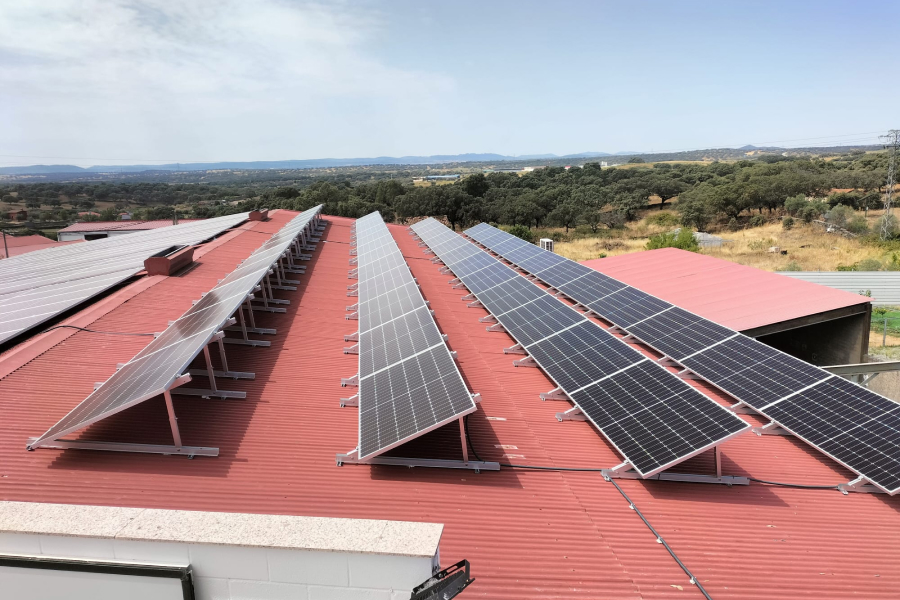Iberdrola España develops a solar community in Malpartida de Plasencia that will benefit 128 families
- Generating 104 MWh of energy per year, they will enable households to reduce their electricity bills and access renewable self-consumption without making any investment.
- The installation, which generates 100% sustainable energy, is on the roof of a carpentry and locksmith business and will have 155 panels.
- On Wednesday 16 a talk will be given in the Casa de la Cultura on how solar communities work, with the mayor of the municipality in attendance.

Iberdrola España has developed a solar community in the municipality of Malpartida de Plasencia that will enable around 128 families to reduce their electricity bills and access renewable self-consumption without the need for their own installation or any type of investment.
The Malpartida de Plasencia installation (located on the roof of a local carpentry and locksmith business) has 155 panels with a total power of 71.3 kWp that will be used for the consumption of the first 128 families that sign up. To do so, they only have to live within a radius of two kilometres from the solar community and be an Iberdrola España customer.
The annual 100% sustainable and local energy generated is expected to reach 104 MWh per year, which will prevent the emission of 21 tonnes of CO2 into the atmosphere, equivalent to planting around 1,043 trees. For Iberdrola España, self-consumption solutions are a way of promoting sustainability while saving on electricity bills.
How to connect in Malpartida de Plasencia
All those interested in joining the solar communities will be able to get information at a service point that Iberdrola España will have in Malpartida de Plasencia at the Casa de la Cultura from 16 Wednesday October until Friday.
On the same Wednesday, at 10:00 a.m., an informational talk will be given on how solar communities work and the energy offers, products and services on offer, adapted to consumers’ needs, at which the mayor of Malpartida de Plasencia, José Raúl Barrado, is expected to be present. Breakfast will be offered to all those attending. On 16, 17 and 18 October, the point will be open to answer any questions that residents may have mornings and afternoons.
You can also read through the information on the Iberdrola Solar Communities website or call the free telephone number 900 92 33 33 33.
What's a solar community and how does it work?
Iberdrola España's solar communities are based on consumption of electricity generated by the group itself (self-consumption) and consist of two main actors: the owners of the roof who offers unused space to install solar panels and generate 100% renewable energy to help them save on their electricity bill (in this case, the Hermanos Muñoz Manzano Carpentry and Locksmiths in Malpartida de Plasencia).
Then, there are the neighbours, who must be within a radius of up to 2 km from the roof, and who take advantage of the surplus generation of the companies' panels, so they can consume clean, local energy without any type of investment, installation or permanence through a subscription model, just like with any digital platform. In this case, 128 families in Malpartida will have access solar energy without installations on their homes.
Neighbours who decide to join the solar community should know that they do not need to make any investment or install anything, that they will have an additional 5% discount off their consumption and guaranteed savings –up to 30% of the bill–. In addition, it is a sustainable energy model, 100% renewable, which will help the planet. Spots for the community are limited.
More than 15,000 families in Extremadura
In Extremadura more than 15,000 families can now access self-consumption thanks to the solar communities installed by Iberdrola España in different parts of the region.
In addition to Malpartida de Plasencia, in the province of Cáceres there are already solar communities installed in the capital of Cáceres itself, in Plasencia, Navalmoral, Miajadas and Coria, among others. In Badajoz, in addition to the capital, they are also present in Almendralejo, Don Benito, Villanueva de la Serena and Mérida, among others.
